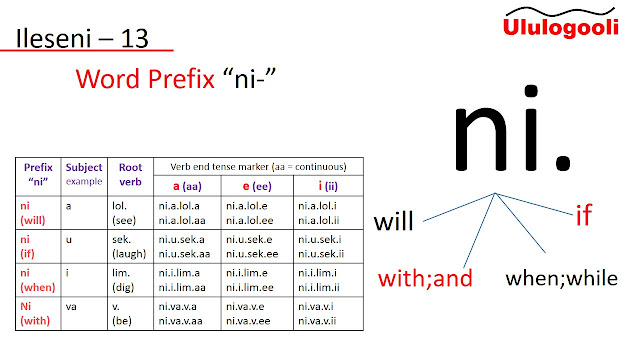Featured
- Get link
- X
- Other Apps
Lesson 13 : Word prefix "ni-"
Discussion
In the order of affixes, “ni-” comes early as a prefix. When a word starts with “ni…”, it can have several meanings.
The first meaning is “an activity going to happen in an unkown time in the future”. Words as “nialime”(she will dig), “nialase” (he sill throw) put an event into the unknown future.
The second meaning of “ni-“ is that it suggests “a conditional word” where prefix “ni-” means “if-”. A word as “ninzya” means “If I go”.
Other example words are: “Nikigwa”(if it will fall), “Niumonyoola”(if you find her/him) and “Nialikaloleke”(if she/he will be seen then).
Thirdly, The use of “ni-” is to suggest “when an activity is happening” of “if an activity has already happened” in example words as “nialimaa”(while digging), “nivizyizaa”(while going).
This prefix “ni-” would pass as a tense marker only for confirmatory than have effect to other prefixes or suffix tenses.
The fourth use of “ni-” is where it tends to enjoin two things in a word. Here it serves as conjunction “and” or “with”. That in lay terms “with them doing” or “and they were…”.
Example words for the third “ni-” use are; “nivagiingi”(and carrying), “nivagonaa”(and sleeping), “niziloka”(and barking).
It should be noted that conditional prefix “ni” can be confused to pronoun prefix “n” in random speech words as <nandyi> [ninlye](I will eat), <nambool’le>[nianvoolele](she will tell me).
In the example, the “ni+n” is ‘corrupted by speech’ to sound <na>.
Another note is that a word can both have the three ‘“ni-” implies’ only when articulated in certain ways. This is due to the tonal nature of Lulogooli.
Example articulations is <niàlola> (and she saw), <niálola> (she sees), <níalola>(if she sees). The falling or rising pronoun “a” can help clarify on meaning.
Exercise
- Write and read words; nintula, ninvavoolela, nivagiingi, niguiviiki
- Use root verbs “las.”(throw) and “deek.”(cook) and pronouns of your choice to construct words using prefix “ni.”
- Get link
- X
- Other Apps

Comments
Post a Comment